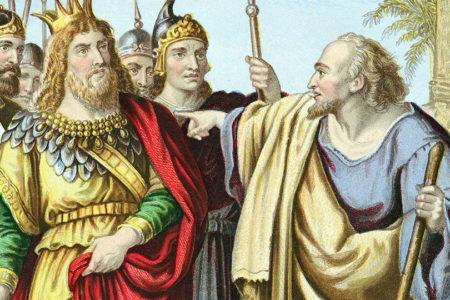His Eye is on the Sparrow
In the spring of 1905, Civilla Martin and her husband, Pastor Walter Martin, visited their friends the Doolittles in Elmira, New York. Mrs. Doolittle had been bedridden for 20 years, and her husband was confined to a wheelchair. But these conditions did nothing to dampen their spirits. When Pastor Martin commented on their hopefulness, Mrs. Doolittle replied, “His eye is on the sparrow, and I know He watches me.”1
Mrs. Doolittle knew how to take God at His word. From that experience, Mrs. Martin wrote a poem that soon became “His Eye Is on the Sparrow,” one of the most enduring hymns ever written about God’s love and faithfulness as expressed in Matthew 10:29–31.
Throughout Scripture, God makes promises He expects us to appropriate. And His Word is forever settled in the heavens (Ps. 119:89). This truth is important because long ago God made a promise that affects both Israel and the church today. And whether we realize it or not, how we view that promise influences our theology and our perspective on the Bible and the world.
Creator’s Prerogative
Today’s world is bent on believing in evolution. It claims that billions of years ago, an itsy bitsy piece of something (origin unknown) exploded, and the entire universe came into being. Then it claims that, over billions of years more, a protozoan became a fish; a fish became a whale (mammal); a whale walked ashore; and eventually it evolved into American astronaut Neil Armstrong who stood on the moon and declared, “That’s one small step for man, one giant leap for mankind.”
People who believe this way reject the Genesis 1 creation account that says God took absolutely nothing and, in six 24-hour days, made absolutely everything. And once you reject God’s power, you are more likely to reject His commandments and promises. If you accept Genesis 1, then you must believe in an all-powerful Creator who has the right to do whatever He wants with His creation. Genesis says the Creator gave a specific land in the Middle East to Abram and his physical descendants through Isaac—forever (12:1–3; 21:12). God told Abram (later called Abraham),
Get out of your country, from your family and from your father’s house, to a land that I will show you. I will make you a great nation; I will bless you and make your name great; and you shall be a blessing. I will bless those who bless you, and I will curse him who curses you; and in you all the families of the earth shall be blessed (12:1–3).
This multifaceted promise is the Abrahamic Covenant. Not only is it still in effect, but it affects both Israel and the church. How Christians view this covenant determines if they subscribe to Replacement Theology or believe that God does what He says.
Heifer, Goat, Ram
Abraham was 75 and childless when he first received this promise. He was 100 when Isaac was finally born. Yet in his lifetime, the only land he owned in Canaan was the cave of Machpelah in Hebron where he and his wife are buried. It is known today as the Tomb of the Patriarchs.
However, God promised him a land that encompasses all of Israel, including the West Bank and Gaza and parts of Jordan, Syria, and Lebanon. Obviously, God’s promise extends beyond Abraham himself to the nation of Israel.
Many today say the Abrahamic Covenant is no longer valid and that the land God gave the Jewish people is up for grabs. However, they could not be more wrong.
Scripture presents two types of covenants: conditional and unconditional. In a conditional covenant, both parties agree to terms, and each must uphold his end of the bargain. In an unconditional covenant, one party agrees to do something regardless of what the other party does. God’s covenant with Abraham was unconditional; God agreed to do everything Himself: “I am the Lᴏʀᴅ, who brought you [Abraham] out of Ur of the Chaldeans, to give you this land to inherit it” (Gen. 15:7).
When Abraham asked God, “How shall I know that I will inherit it?” (v. 8), God told him to get a heifer, goat, and ram, plus a dove and pigeon. Abraham cut everything in half but the birds and placed the halves opposite each other, making an aisle in between (v. 10).
Today lawyers hammer out contracts. In ancient times the contracting parties walked between divided animals, as if to say, “If either of us breaks this promise, what has happened to these animals will happen to us. We will die.” You laid your life on the line when you made a covenant. In fact, the Hebrew word for “covenant” also means “cutting.” It is the same word used for “circumcision,” which is the sign of the Abrahamic Covenant.
So Abraham cut the animals. In fact, to let us know the animals were clearly dead, Scripture says, “When the vultures came down on the car-casses, Abram drove them away” (v. 11). Then the living God did some-thing He does nowhere else in Scripture: He put Abraham to sleep and “walked” between the pieces, placing responsibility for maintaining the covenant on Himself alone:
And it came to pass, when the sun went down and it was dark, that behold, there appeared a smoking oven and a burning torch that passed between those pieces. On the same day the Lᴏʀᴅ made a covenant with Abram, saying: “To your descendants I have given this land, from the river of Egypt to the great river, the River Euphrates—the Kenites, the Kenezzites, the Kadmonites, the Hittites, the Perizzites, the Rephaim, the Amorites, the Canaanites, the Girgashites, and the Jebusites”(vv. 17–21).
He also told Abraham,
Know certainly that your descendants will be strangers in a land that is not theirs, and will serve them, and they will afflict them four hundred years. And also the nation whom they serve I will judge; afterward they shall come out with great possessions. But in the fourth generation they shall return here, for the iniquity of the Amorites is not yet complete (vv. 13–14, 16).
These few verses summarize the books of Exodus, Numbers, and Deuteronomy. God brought Abraham to the threshold of the events in the book of Joshua, where his descendants would take possession of the land He gave them.
How Long Is Everlasting?
Scripture says, “For by grace you have been saved through faith, and that not of yourselves; it is the gift of God” (Eph. 2:8). Scripture also says nothing can separate you from the love of God in Christ Jesus (Rom. 8:38–39). Nothing means even you cannot separate yourself from God’s love. Satan, however, calls God a liar and would have you believe God will take back His gift of salvation if you’re not careful.
My friend, that is not possible! He promises, “The one who comes to Me I will by no means cast out” (Jn. 6:37). “I will never leave you nor forsake you” (Heb. 13:5). “My sheep hear My voice, and I know them, and they follow Me. And I give them eternal life, and they shall never perish; neither shall anyone snatch them out of My hand” (Jn. 10:27–28). You can count on God to keep you saved. He made those promises, and He never lies.
He also promised land to Israel as an “everlasting possession” (Gen. 17:8; 48:4). How long is everlasting? Until the United Nations says the time is up? Until Washington, DC, does? Until the Russians do?
God does not care what Washington thinks. Nor does He care what the UN or Russia thinks. In fact, He doesn’t care what you or I think. When God says “everlasting,” He means “without end.” He whose eye is on the tiny sparrow “rules in the kingdom of men, and gives it to whomever He chooses” (Dan. 4:32). He does as He pleases and tells us, “Indeed before the day was, I am He; and there is no one who can deliver out of My hand; I work, and who will reverse it?” (Isa. 43:13).
He says, “‘For My thoughts are not your thoughts, nor are your ways My ways,’ says the LORD. ‘For as the heavens are higher than the earth, so are My ways higher than your ways, and My thoughts than your thoughts’” (55:8–9).
This same God promised Abraham’s physical (not spiritual) descendants a specific land. He did not promise this land to the church. Nor did He leave it to the UN or to the descendants of Ishmael.
And Israel’s failure to keep the Mosaic Covenant, made later at Mount Sinai, does not affect God’s promises in the Abrahamic Covenant. In Jeremiah 31 God promised to make another covenant with the Jewish people, “not according to the covenant that I made with their fathers in the day that I took them by the hand to lead them out of the land of Egypt, My covenant which they broke” (v. 32, emphasis added).
God here promised the New Covenant, designed to replace the Mosaic, not the Abrahamic, Covenant. Ownership of the land comes through the Abrahamic Covenant; possession and blessing come through the Mosaic. Because Israel broke the Mosaic Covenant, it temporarily lost possession. But it can never lose ownership. One day Israel will regain permanent possession and blessing forever.
Why? Because God is faithful. The apostle Paul understood this fact and warned Gentiles not to “boast” against the Jewish people because all the covenants belong to them; Gentiles are grafted in by faith (Rom. 11).
God keeps His promises. He who neither slumbers nor sleeps and whose eye is on the sparrow watches you, me, and His beloved people Israel. Great is His faithfulness.
ENDNOTE
- “His Eye Is on the Sparrow” <cyberhymnal.org/htm/h/i/hiseyeis.htm>.






